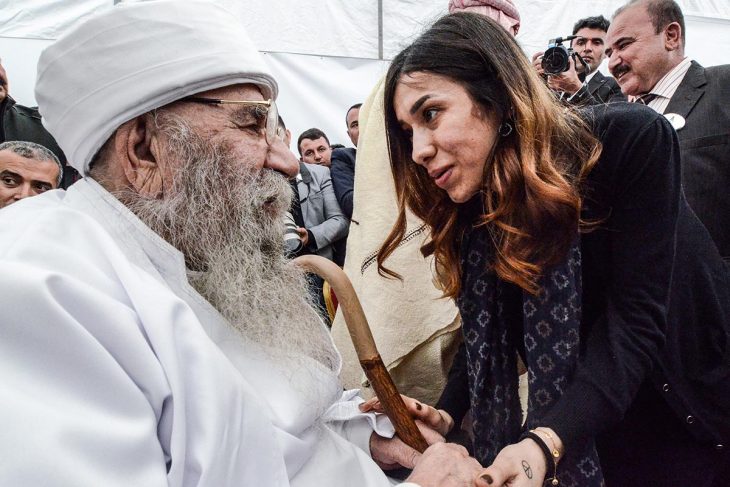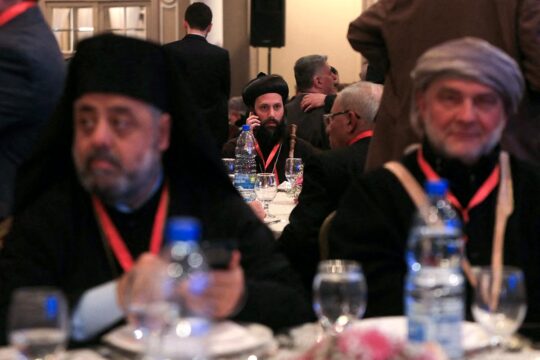In the courtroom in Koblenz, where Syrian torture survivors have been testifying for the past nine months, sexual violence has not been spoken about frequently or at length. Certain witness statements have shown that, like torture, sexual violence has been used systematically in the Assad regime’s prison system. A human rights lawyer talked about women who got an abortion after their release and could not tell their families what had happened to them during their detention. A female survivor described constant threats of rape in secret service branch 251 in Damascus, and remembered her cell mate whose husband divorced her after she was released – “because anything could have happened in prison”. And a male survivor underwent the judges’ detailed questions about how he was raped with an object during an interrogation in branch 251 – or Al-Khatib prison – in August 2011.
In the so-called Al-Khatib trial, two former Syrian regime officers are accused of crimes against humanity for their involvement in the killing and torture of detainees. Anwar Raslan, the higher-ranking officer, is charged with a case of rape and one of sexual assault. But unlike the 58 cases of killing and 4,000 cases of torture he is accused of, the rape and sexual assault are charged as individual crimes rather than as crimes against humanity. However, this might be about to change: in November, the civil party lawyers in Koblenz filed a motion calling for the judges to legally consider crimes of sexual violence as constituent of the crimes against humanity defined in the indictment. A decision on this motion has not been delivered yet.
Crimes against humanity are defined as a widespread and systematic attack on a civilian population. Victims’ rights groups and experts have criticized the disregard of that systematic pattern when it comes to sexual violence. “As the Caesar photos demonstrate, torture against men is the prevalent crime in the Syrian detention facilities. However, that does not mean other crimes and crimes against other persons have not been committed,” says Alexandra Lily Kather, a legal practioner and consultant in the field of international justice, adding that investigations must be extended to include crimes committed against various members of Syrian society. For her, it is not just about this particular case: “We are setting the blueprint for when other members of the Syrian intelligence services are arrested.”
Abuse in prison is followed by isolation in society
Kather is an expert on sexual and gender-based violence and has worked for the European Center of Constitutional and Human Rights (ECCHR), which supports Syrian witnesses in the Al-Khatib trial. According to her, qualifying sexual violence not as a crime against humanity but as a crime under the German Criminal Code strips these crimes of their context, and thus of their political dimension. “Sexual violence is about the exercise of power over others and has been used as a tool aimed at weakening the political opposition movement,” says Kather, adding that especially in a society like Syria’s, it was the strength of the family and the community that held that movement together. “If you commit crimes that will lead to the exclusion or even death of female group members, you really weaken that movement.”
As some of the witnesses clarified, victims of sexual violence in detention may be abandoned by their family and friends, not be able to get married, or in the worst cases, be killed by a family member. “Many women were sexually harassed or raped in Syrian prisons and afterwards became isolated in society,” said one of the female witnesses in Koblenz, adding that sexual violence was a typical torture method used by the secret services against men and women. Investigating these crimes becomes even more challenging with witnesses reluctant to speak about what happened to them. Could this be the reason the prosecution has not included these crimes as crimes against humanity in the indictment?
The official answer is: there was not enough evidence at the time. "In the indictment, the Federal Prosecutor’s office alleged that the systematic and widespread attack against the civilian population by the Syrian regime also included crimes of sexual violence. However, the investigations had not shown sufficient evidence that sexual violence had been committed systematically in Branch 251," the prosecution told Justice Info. In December, the Koblenz prosecution issued a statement in court, supporting the motion filed by the civil parties.
But Kather still sees further need for action: “We have to create the conditions in which survivors of very sensitive crimes feel supported enough to come forward,” she argues, listing legal, medical, psychosocial and community support that the German state should, according to her, put in place. “It does not make sense to have a universal jurisdiction framework in place, if the appropriate protective measures and support structures are missing.”
Yazidi women targeted for enslavement and sexual violence
Meanwhile, less than one hundred kilometres southeast of Koblenz, a different trial with some similarities has been taking place – with a similar motion being filed. In Frankfurt, Taha Al-J. is the first former Islamic State-fighter to be accused of genocide against the Yazidis in northern Iraq, for enslaving a woman and her daughter and causing the death of the girl by leaving her chained to a window in the blazing summer heat. And there too, civil party lawyers in December filed a motion to have gender-based persecution considered as a crime against humanity. “The charges in this milestone case should reflect the full scope of criminal conduct in question,” said victims’ counsel Amal Clooney. “This includes genocide as well as crimes against humanity that targeted women for enslavement and sexual violence.”
Sexual and gender-based violence are often mentioned in one breath. But it can be important to differentiate between the two: while the former describes crimes with a sexual component such as rape, forced prostitution or sexual slavery, the latter refers to crimes which are inflicted on a certain group because of their gender, such as forced marriage or torture and slavery of women and girls. When Islamic State attacked the Yazidi community in northern Iraq, they separated people according to their gender, and forced women and girls into slavery.
In Frankfurt as in Koblenz, the two motions are different, but have a similar goal: to use justice as a means to fully understand what happened to victims of the gravest crimes in Syria and Iraq. “There is a tendency to focus on one group and not have an intersectional gender-sensitive lens to see against whom and for what reason crimes were committed and what was the discriminatory intent behind them,” says Kather. “With the first trials, it is especially crucial that we get the landscape right of what happened.”








